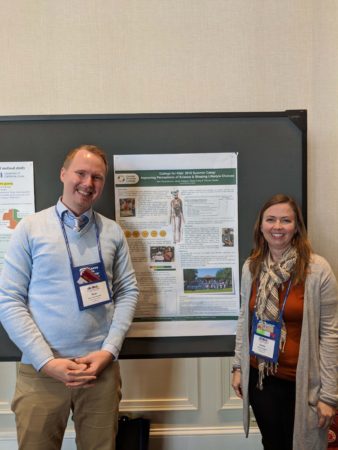
Sam Rauhalammi, Professor of Biological Sciences at CAC, and Jamie Wolgast, College for Kids Program Director
The Central Arizona College Aravaipa Campus College for Kids program was featured during the recent American Camp Association’s (ACA) National Conference held in Nashville, TN.
The abstract, ‘College for Kids’ 2018 Summer Camp: Improving Perceptions of Science & Shaping Lifestyle Choices by Sam Rauhalammi, Jamie Wolgast, Elissa Craig and Theresa Radke was one of two small day camps selected to present a talk and poster during the conference.
Sam Rauhalammi, Professor of Biological Sciences at CAC, and Jamie Wolgast, College for Kids Program Director, represented CAC at the 2019 American Camp Association (ACA) Research Forum. During their presentation they explained how ‘A two-week day camp can have a large impact,’ discussing their experiences of using anatomy laboratory sessions to improve students’ perception of science, and shaping families’ lifestyle choices through educating the children. They shared their tips and tricks on how Central Arizona College’s ‘College for Kids’ summer camp inspires K12 students to pursue College level studies, and provides a fun summer break for children from diverse backgrounds.
College for Kids is a day camp, organized annually, at the Central Arizona College’s Aravaipa campus. Over two weeks of the summer, it provides children an educational full-day program from Monday to Thursday. The camp serves youth from local communities surrounding the Campus. Many students attend on a full or partial scholarship. During the camp, transportation, all supplies, daily snacks and warm lunches are provided for participants. College for Kids’ theme for the summer 2018 was human anatomy. This topic was chosen to support biological science classes at students’ own schools, introduce locals to the college’s campus and promote healthy lifestyle choices through education.
In 2018, fifty students (grades 2-6) and 12 group leaders (grade≥7) participated in seven anatomy laboratory sessions. Each session lasted 40 minutes, had 16-18 students and four group leaders per class. Sessions were delivered in a science laboratory by a college biology professor and three volunteer helpers. Major body systems were discussed using a mixture of activities. Each student received a 19-inch tall plastic model of a human skeleton, to which structures were added using modeling clay. Supplementary hands-on experiments included handling living animals, performing chemical reactions, testing samples, studying real animal/human organs, investigating anatomical models and completing student workbook activities.
Based on the research conducted during the 2018 College for Kids, evidence shows how this summer camp improved student’s attitudes towards science and how students perceived their favorite laboratory activities as being most transferrable to their families’ daily life. An increased interest in science can be attributed to positive learning experiences, better understanding of the subject matter and development of the participants’ practical skillset. Students learned about positive lifestyle choices and were provided opportunities to overcome their fears and grow self-confidence in a safe classroom environment. The summer camp improved students’ abilities to interact and communicate with others, and improved their ability to demonstrate teamwork skills while working in a group setting.
Rauhalammi explained, “It has been previously shown (American Camp Association, 2018) that attending camps provides transferrable skills, increases college readiness and develops interpersonal abilities. We wanted to quantify the effectiveness of a two-week summer camp in shaping participants’ attitudes towards science subjects and assess students’ self-reported transferability of study material into the daily lives of their families.” He added, “As a scientist myself, I think that it has been fantastic to see how we are incorporating more robust methods to assess College for Kids’ success, and doing this in a more systematic manner. – This [how to assess success of a summer camp / camp experience] was one of the central themes of the conference, and I believe that our work [on this] will help us to further develop our already outstanding camp – as well as, validate our successes to the donors and partners.”
Wolgast has been the College for Kids Program Director for 11 years. She stated, “The kids are always priority number one. It has always been my goal to provide the best possible program for them and our community. I had never done anything like this before. I am grateful to SaddleBrooke Community Outreach for providing the funds that made it possible to attend this conference. It feels so great to now be connected to a larger group of other camp directors and educators who offer us encouragement, support, and a wealth of resources. We look forward to using the tools we learned at ACA to take College for Kids to the next level.”
Both Rauhalammi and Wolgast expressed their appreciation to SaddleBrooke Community Outreach, Salt River Project, Arizona Public Service, Winkelman Natural Resource Conservation District and other donors for the many years that have supported this program. They are also grateful for the volunteers, families and campus staff for making the camp a success year after year.
The 2019 College for Kids camp will focus on Animal Biology. Registration information and applications will be available later this spring.
For more information about the College for Kids program contact elissa.craig@centralaz.edu, or call 520-357-2810.
